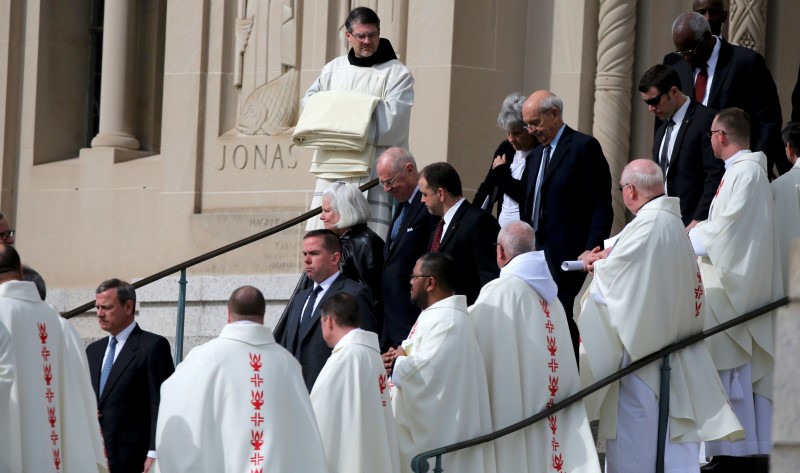By Lawrence Hurley
WASHINGTON (Reuters) - The U.S. Supreme Court resumed work on Monday for the first time since Antonin Scalia's death, with Chief Justice John Roberts paying tribute to the long-serving jurist before the remaining justices engaged in a testy argument over the rights of criminal defendants.
"We remember his incisive intellect, his agile wit and his captivating prose. But we cannot forget his irrepressible spirit," Roberts said of Scalia, a conservative who served three decades on the court before his Feb. 13 death at age 79.
In remarks before arguments held in two cases, Roberts said Scalia wrote 282 majority opinions. "He was also known, on occasion to dissent," Roberts joked, referring to Scalia's trenchant opinions when on the losing side.
Inside the court's white marble and crimson-draped chamber, Scalia's black-draped chair stood empty alongside the eight remaining justices.
The second of the arguments, a Utah criminal case, illustrated the difficulties the shorthanded court may face in making divisive rulings while divided evenly ideologically, with four conservatives and four liberals.
President Barack Obama is preparing to nominate Scalia's successor. Leading Senate Republicans have vowed to block any nominee from the Democratic president, with the court's balance of power at stake.
Utah officials appealed a lower-court ruling that key evidence against Edward Strieff, convicted of methamphetamine possession and a related drug charge, was inadmissible because it violated the U.S. Constitution's ban on unreasonable searches and seizures.
Sonia Sotomayor and other liberal justices signaled support for Strieff. Roberts and fellow conservative Samuel Alito appeared more supportive of Utah.
His lawyers contend Strieff's constitutional rights were violated because although there was an existing warrant for his arrest, the police officer did not know that when he stopped Strieff's vehicle and found incriminating evidence.
Sotomayor said a ruling in their favor could encourage police to stop people without good reason, hoping a warrant existed that would permit a search.
"What stops us from becoming a police state?" Sotomayor asked.
Sotomayor said such a ruling would disproportionately impact cities where a large number of people have outstanding arrest warrants such as Ferguson, Missouri, where a white policeman killed an unarmed black 18-year-old in 2014, sparking protests.
A ruling favoring police could give them "very good incentive for just standing on the street corner ... and asking every citizen, 'Give me your ID,'" Sotomayor said.
Roberts said it would be "bad police work" not to check for a warrant.

Scalia had backed police in similar cases. His absence increases the chances of a 4-4 split in which the lower-court ruling would stand but no national precedent would be set.